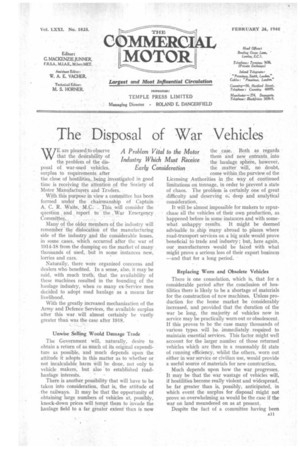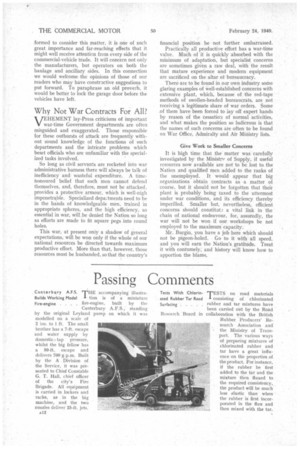The Disposal of War Vehicles
Page 13

Page 14

If you've noticed an error in this article please click here to report it so we can fix it.
E are pleased to observe that the desirability of the problem of the dis posal of war-used vehicles, Early Con surplus to requirements after the close of hostilities, being investigated in good time is receiving the attention of the Society of Motor Manufacturers and Traders.
With this purpose in view a committee has been formed under the chairmanship of Captain A. C. R. Waite, M.C. . This will consider the question and report to the , War Emergency Committee.
Many of the older members of the industry will remember the dislocation of the manufacturing side of the industry and the considerable losses, in some cases, which occurred after the war of 1914-18 from the dumping on the market of many thousands of used, but in some instances new, lorries and cars.
Naturally, there were organized concerns and dealers who benefited. In a sense, also, it may be said, with much truth, that the availability of these machines resulted in the founding of the haulage industry, when so many ex-Service men decided to adopt road haulage as a means for livelihood.
With the greatly increased mechanization of the Army and Defence Services, the available surplus alter this war will almost certainly be vastly greater than was the case after 1918.
Unwise Selling Would Damage Trade The Government will, naturally, desire to obtain a return of as much of its original expenditure as possible, and much depends upon the attitude it adopts in this matter as to whether or not incalculable. harm will be done, not only to vehicle makers, but also to established roadhaulage interests.
There is another possibility that will have to be taken into consideration, that is, the attitude of the railways. It may be that the opportunity of obtaining large numbers of vehicles at, possibly, knock-down prices will tempt them to invade the haulage field to a far greater extent than is now Both as regards them and new entrants, into Must Receive the haulage sphere, however, sideration the matter will, no doubt, come within the purview of the Licensing Authorities in the way of continued limitations on tonnage, in order to prevent a state of chaos. The problem is certainly one of great difficulty and deserving o; deep and analytical consideration.
It will be almost impossible for makers to repurchase all the vehicles of their own production, as happened before in some instances and with somewhat unhappy results. It might be deemed advisable to ship 'many abroad to places where road-transport services on a big scale would prove beneficial to trade and industry ; but, here again, our manufacturers would be faced with what might prove a serious loss of their export business —and that for a long period.
Replacing Worn and Obsolete Vehicles There is one consolation, which is, that for a considerable period after the conclusion of hostilities there is likely to be a shortage of materials for the construction of new machines. Unless production for the home market be considerably increased, and provided that the duration of the war be long, the majority of vehicles now in service may be practically worn out or obsolescent. If this proves to be the case many thousands of various types will be immediately required to maintain essential services. This factor might well account for the larger number of those returned vehicles which are then in a reasonably fit state of running efficiency, whilst the others, worn out either in war service or civilian use, would provide a useful source of materials for new construction.
Much depends upon how the war progresses. It may be that the war wastage of vehicles will, if hostilities become really violent and widespread, be far greater than is, possibly, anticipated, in which event the surplus for disposal might not prove so overwhelming as would be the case if the war on land meandered on as at present.
Despite the fact of a committee having been formed to consider this matter, it is one of such great importance and far-reaching effects that it might well receive attention from every side of the commercial-vehicle trade. It will concern not only the manufacturers, but operators on both the haulage and ancillary sides. In this connection we would wercome the opinions of those of our readers who may have constructive suggestions to put forward. To paraphrase an old proverb, it would be better to lock the garage door before the vehicles have left.
Why Not War Contracts For All?
VJEHEMENT lay-Press criticisms of important V war-time Government departments are often misguided and exaggerated. Those responsible for these outbursts of attack are frequently without sound knowledge of the functions of such departments and the intricate problems which beset officials who are unfamiliar with the specialized tasks involved.
So long as civil servants are rocketed into war administrative harness there will always be talk of inefficiency and wasteful expenditure. A timehonoured belief that such men cannot defend themselves, and, therefore, must not be attacked, provides a protective armour, which is well-nigh impenetrable. Specialized depal-tments need to be in the hands of knowledgeable men, trained in appropriate spheres, and the high efficiency, so essential in war, will be denied the Nation so long as efforts are made to fit square pegs into round holes.
This war, at present only a shadow of general expectations, will be won only if the whole of our national resources be directed towards maximum productive effort. More than that, however, those resources must be husbanded, so that the country's financial position be not further embarrassed. Practically all productive effort has a war-time value. Much of it is quickly absorbed with the minimum of adaptation, but specialist concerns are sometimes given a raw deal, with the result that mature experience and modern equipment are sacrificed on the altar ol bureaucracy.
There are to be found in our own industry some glaring examples of well-established concerns with extensive plant, which, because of the red-tape methods of swollen-headed bureaucrats, are not receiving a legitimate share of war orders. Some .of them have been forced to iay off expert hands by reason of the cessation of normal activities, and what makes the position so ludicrous is that the names of such concerns are often to be found on War Office, Admiralty and Air Ministry lists.
Give Work to Smaller Concerns It is high time that the matter was carefully investigated by the Ministry of Supply, if useful resources now available are not to be lost to the Nation and qualified men added to the ranks of the unemployed. It would appear that big organizations obtain contracts as a matter of course, but it should not be forgotten that their plant is probably being taxed to the uttermost under war conditions, and its efficiency thereby imperilled. Smaller but, nevertheless, efficient concerns should constitab a vital link in the chain of national endeavour, for, assuredly, the war will not be won if our workshops be not employed to the maximum capacity.
Mr. Burgin, you have a job here which should not be pigeon-holed. Go to it with all speed, and you will earn the Nation's gratitude. Treat it with contumely, and history will know how to apportion the blame.




















































